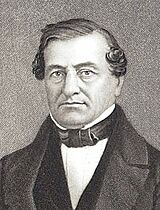Pierre Adolphe Rost facts for kids
Pierre Adolphe Rost (1797 – September 6, 1868) was an important person from Louisiana. He was a politician, a diplomat (someone who represents their country in other nations), a lawyer, a judge, and a plantation owner.
Early Life and Moving to America
Pierre Adolphe Rost was born in France in 1797. He went to a special school in Paris called the École Polytechnique. This school trained people for government jobs or the military. Pierre was an artilleryman, which means he worked with cannons. He was recognized for his bravery when defending Paris in 1814. He wanted to join Napoleon's army later, but he was too late for the famous Battle of Waterloo.
Pierre felt that the government in France was unfair, so he decided to move to the United States. He arrived in New Orleans, Louisiana in the spring of 1816. After that, he worked as a teacher in Natchez, Mississippi. While teaching, he also studied law to become a lawyer. He learned from Joseph Emory Davis, who was the brother of Jefferson Davis.
Later, Rost moved to Natchitoches, Louisiana. Many people there spoke French, which was his first language. He thought this would help him succeed in his law practice. In 1826, he was chosen to be a member of the Louisiana State Senate, where he served for four years.
In 1830, Pierre Rost was considered for a spot in the U.S. Congress. However, he was getting married to Louise Odile Destrehan around that time. The wedding preparations took up a lot of his time, and he didn't focus much on his political campaign. Because of this, he lost the election by just a few votes.
After the election, in late 1830, he moved with his family to New Orleans. He continued to work as a lawyer for the next eight years. In 1838, he took his family on a trip to Europe to visit his mother and sisters. They returned to the U.S. later that year.
Life at Destrehan Plantation
In 1830, Pierre Rost married Louise Odile Destrehan. She had been married before. In 1839, he bought Destrehan Plantation in St. Charles Parish, Louisiana. This plantation had been connected to Louise's family since 1802.
After his trip to Europe, Rost was appointed as a judge for the Supreme Court of Louisiana. He served from March to June 1839, but then he decided to leave the court to focus on farming. He returned to the Supreme Court on March 19, 1846, and served until May 4, 1853.
During the American Civil War, Pierre Rost supported the Confederacy. On March 16, 1861, Confederate President Jefferson Davis chose Rost, William Lowndes Yancey, and Ambrose Dudley Mann to be the first Confederate representatives to Europe. Rost was sent to Spain. Yancey went to England and France, and Mann later went to Belgium and the Vatican. The three men sailed to Europe together on March 31, 1861. Rost and Yancey were later replaced by other diplomats.
Rost owned the Destrehan Plantation, which was also known as the Rost Home Colony. During the Civil War, the plantation was taken over by the government agency called the Bureau of Refugees, Freedmen and Abandoned Lands. From 1865 to 1866, it was used as a special community for freed people (people who had been enslaved). This community had its own hospital, schools, a store, and even a police force. After the war, President Andrew Johnson gave Rost a full pardon, and he successfully got his property back.
Pierre Adolphe Rost continued to practice law until he passed away in New Orleans, Louisiana, on September 6, 1868.
Works
- Eulogy upon the life and character of George Eustis,: Formerly chief justice of the Supreme court of Louisiana. Pronounced at Lyceum hall, on the 31st March, 1859 (1859)
 | Precious Adams |
 | Lauren Anderson |
 | Janet Collins |


